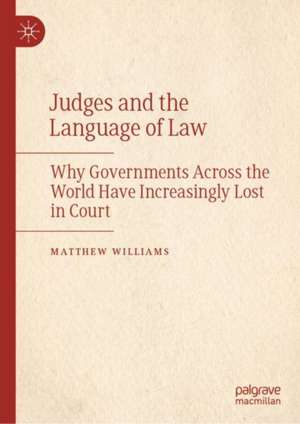Judges and the Language of Law: Why Governments Across the World Have Increasingly Lost in Court
Autor Matthew Williamsen Limba Engleză Hardback – 17 ian 2022
| Toate formatele și edițiile | Preț | Express |
|---|---|---|
| Paperback (1) | 729.84 lei 6-8 săpt. | |
| Springer International Publishing – 18 ian 2023 | 729.84 lei 6-8 săpt. | |
| Hardback (1) | 735.21 lei 6-8 săpt. | |
| Springer International Publishing – 17 ian 2022 | 735.21 lei 6-8 săpt. |
Preț: 735.21 lei
Preț vechi: 896.60 lei
-18% Nou
Puncte Express: 1103
Preț estimativ în valută:
140.70€ • 145.100$ • 117.60£
140.70€ • 145.100$ • 117.60£
Carte tipărită la comandă
Livrare economică 15-29 martie
Preluare comenzi: 021 569.72.76
Specificații
ISBN-13: 9783030914943
ISBN-10: 3030914941
Pagini: 279
Ilustrații: XX, 408 p. 46 illus.
Dimensiuni: 148 x 210 x 33 mm
Greutate: 0.66 kg
Ediția:1st ed. 2022
Editura: Springer International Publishing
Colecția Palgrave Macmillan
Locul publicării:Cham, Switzerland
ISBN-10: 3030914941
Pagini: 279
Ilustrații: XX, 408 p. 46 illus.
Dimensiuni: 148 x 210 x 33 mm
Greutate: 0.66 kg
Ediția:1st ed. 2022
Editura: Springer International Publishing
Colecția Palgrave Macmillan
Locul publicării:Cham, Switzerland
Cuprins
Part 1. Language in Contemporary Politics.- Chapter 1. Introduction and State of the Art.- Chapter 2. Modern Political Language.- Part 2. Quantitative History.- Chapter 3. The “New Constitutionalism” in 187 Countries.- Chapter 4. Regulating the Extent of the State in Five Democracies.- Part 3. Qualitative History.- Chapter 5. Rule of Law without a Constitution in the UK.- Chapter 6. Federalism and Party Polarisation in the US.- Chapter 7. Mixed Legal Systems with Human Rights Reform in Canada.- Chapter 8. Executive Dominance with Decentralisation in France.- Chapter 9. The Burden of History, with the Promise of Philosophy in Germany.- Chapter 10. Conclusions.
Notă biografică
Matthew Williams is Tutor and Fellow of Jesus College, University of Oxford, UK. He lectures on British and comparative politics. His research analyses the language of politics, how the language of legislation has changed over the past century, and the effects of these changes on litigation strategies and public administration.
Textul de pe ultima copertă
“Matthew Williams’ masterful analysis, which straddles history, law and political science, causes us to rethink key theories of the judicialization of politics. His work is a tour de force that will be appreciated not only for its combination of computational text analysis and process tracing histories, but also for its expansive ambition, covering seven decades and five jurisdictions.”
– Petra Schleiter, Professor of Comparative Politics, University of Oxford, United Kingdom
“We live in an age of data and data analytics. Analysing huge swathes of legislative text across time and jurisdictions, Matthew Williams has revealed a series of fascinating changes in language use. This clearly written book with its compelling narrative is an important contribution to our understanding of law and policy in the 21st century.”
– Sir Nigel Shadbolt, Professor of Computer Science, University of Oxford, United Kingdom
By machine reading 60,556,672 words of legislation, and analysing 7,469 country years, this book uncovers changing patterns in the language of laws. In addition to this wide angle, a tight focus on five countries — Canada, France, Germany, the UK and the US — reveals the effects of changing legal language on policy power for judges. With this new perspective and new data, the book explains how and why judges have become more actively involved in public policy disputes on such sensitive topics as abortion, human rights and terrorism.Matthew Williams is Tutor and Fellow of Jesus College, University of Oxford, UK. He lectures on British and comparative politics. His research analyses the language of politics, how the language of legislation has changed over the past century, and the effects of these changes on litigation strategies and public administration.
– Petra Schleiter, Professor of Comparative Politics, University of Oxford, United Kingdom
“We live in an age of data and data analytics. Analysing huge swathes of legislative text across time and jurisdictions, Matthew Williams has revealed a series of fascinating changes in language use. This clearly written book with its compelling narrative is an important contribution to our understanding of law and policy in the 21st century.”
– Sir Nigel Shadbolt, Professor of Computer Science, University of Oxford, United Kingdom
By machine reading 60,556,672 words of legislation, and analysing 7,469 country years, this book uncovers changing patterns in the language of laws. In addition to this wide angle, a tight focus on five countries — Canada, France, Germany, the UK and the US — reveals the effects of changing legal language on policy power for judges. With this new perspective and new data, the book explains how and why judges have become more actively involved in public policy disputes on such sensitive topics as abortion, human rights and terrorism.Matthew Williams is Tutor and Fellow of Jesus College, University of Oxford, UK. He lectures on British and comparative politics. His research analyses the language of politics, how the language of legislation has changed over the past century, and the effects of these changes on litigation strategies and public administration.
Caracteristici
Analyses how the language of the law has changed over time Explains how changes to the language have empowered judges to rule against governments Incorporates findings from a century of changes to the law
